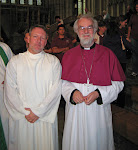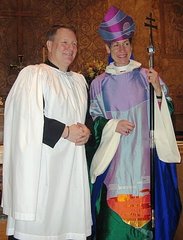The Rev. Canon Dr. Jane Shaw, dean of divinity, chaplain and fellow of New College, Oxford, chimes in in The Guardian about her favorite covenant:
Face to Faith:
The bond of baptism means we have no need for a new 'essential' Anglican covenant, says Jane Shaw
The Rev Canon Dr Jane Shaw
Saturday October 6, 2007

For Christians, the rite of baptism brings us into the body of Christ. It is about sharing a radical equality as children of God. Paul made this clear in his letter to the Galatians: "For in Christ Jesus you are all children of God through faith ... There is no longer Jew or Greek, there is no longer slave or free, there is no longer male or female." This was startling in the hierarchical Roman society into which the church was born, where you might find yourself in a small room, knee to knee, sharing a meal with a man who was your social superior, or with a slave or a Roman matron, with whom you would never, in the normal conventions of the day, have mixed. It is startling today; not in the same way, not in the formal breaking of hierarchies in our apparently democratic society, but in the linking of different peoples across villages, towns, countries and the globe, through that bond of baptism. We call this a baptismal covenant.
The gospels relate that when John the Baptist baptised Jesus, God's voice boomed from the heavens: "This is my son, the Beloved, with whom I am well pleased." And the heavens echo with that phrase every time a child or adult enters the waters of baptism: "This is my daughter, my son, the Beloved, with whom I am well pleased." Baptism is both a recognition and an acceptance on our parts that we are always and already loved by God. Baptism marks a choice to enter into a community that first of all believes that all human beings are made in the image and likeness of God and are therefore God's beloved; and, secondly, accepts the call to express that love in the world. Christians follow Jesus, who said to his disciples: love one another as I have loved you. Baptism is a call to serve based on acknowledging the worth of every single human being. We are each, lay and ordained, called to that radical service grounded in love. In the baptismal covenant, there are rightly no distinctions between persons. We are all the beloved children of God, called to share life with each other and love one another as God loves us.
There is much talk at present in the Anglican communion of a new covenant to bind us together. This is seen as a solution to our problems, to our disagreements about homosexuality. Some argue that we just need to agree to certain new "essentials". But many of us hesitate to embrace such a covenant because we already have a covenant: our baptismal covenant. That is how we are joined together and it is based on the long-established "essentials": the historic creeds. From the very earliest days of Christianity, baptism marked that moment when men and women assented to the Christian essentials - one God: Father, Son and Holy Spirit - and came into relationship with those who shared this belief in the creator God, the risen Christ and the Spirit who sustains us daily. Baptism is therefore the foundation of our identity as Christians. With Paul's words to the Galatians in our memories, we hesitate to assent to a covenant in which there will be a new distinction between lay and ordained by handing over decision-making power to the Anglican primates. Having made our assent to the historic creeds, we hesitate to create new "essentials" about an issue - homosexuality - that may be purely of this moment. (emphasis added)
Let me suggest another response to the Anglican crisis. All we really have to do in the midst of this crazy church dispute is be awake to our relationship with a loving God. And to do that, warring Anglicans simply have to recall their baptism: that moment when the waters washed over us and the heavens echoed with God's declaration about each of us - you are my beloved son, my beloved daughter, with you I am well pleased. If we remember that, really remember it, disputes might "wither like the grass and fade like the flowers" as Isaiah puts it, as we are bathed in the knowledge of God's love for each and every one of us.
Thanks to Thinking Anglicans for the link.
Face to Faith:
The bond of baptism means we have no need for a new 'essential' Anglican covenant, says Jane Shaw
The Rev Canon Dr Jane Shaw
Saturday October 6, 2007

For Christians, the rite of baptism brings us into the body of Christ. It is about sharing a radical equality as children of God. Paul made this clear in his letter to the Galatians: "For in Christ Jesus you are all children of God through faith ... There is no longer Jew or Greek, there is no longer slave or free, there is no longer male or female." This was startling in the hierarchical Roman society into which the church was born, where you might find yourself in a small room, knee to knee, sharing a meal with a man who was your social superior, or with a slave or a Roman matron, with whom you would never, in the normal conventions of the day, have mixed. It is startling today; not in the same way, not in the formal breaking of hierarchies in our apparently democratic society, but in the linking of different peoples across villages, towns, countries and the globe, through that bond of baptism. We call this a baptismal covenant.
The gospels relate that when John the Baptist baptised Jesus, God's voice boomed from the heavens: "This is my son, the Beloved, with whom I am well pleased." And the heavens echo with that phrase every time a child or adult enters the waters of baptism: "This is my daughter, my son, the Beloved, with whom I am well pleased." Baptism is both a recognition and an acceptance on our parts that we are always and already loved by God. Baptism marks a choice to enter into a community that first of all believes that all human beings are made in the image and likeness of God and are therefore God's beloved; and, secondly, accepts the call to express that love in the world. Christians follow Jesus, who said to his disciples: love one another as I have loved you. Baptism is a call to serve based on acknowledging the worth of every single human being. We are each, lay and ordained, called to that radical service grounded in love. In the baptismal covenant, there are rightly no distinctions between persons. We are all the beloved children of God, called to share life with each other and love one another as God loves us.
There is much talk at present in the Anglican communion of a new covenant to bind us together. This is seen as a solution to our problems, to our disagreements about homosexuality. Some argue that we just need to agree to certain new "essentials". But many of us hesitate to embrace such a covenant because we already have a covenant: our baptismal covenant. That is how we are joined together and it is based on the long-established "essentials": the historic creeds. From the very earliest days of Christianity, baptism marked that moment when men and women assented to the Christian essentials - one God: Father, Son and Holy Spirit - and came into relationship with those who shared this belief in the creator God, the risen Christ and the Spirit who sustains us daily. Baptism is therefore the foundation of our identity as Christians. With Paul's words to the Galatians in our memories, we hesitate to assent to a covenant in which there will be a new distinction between lay and ordained by handing over decision-making power to the Anglican primates. Having made our assent to the historic creeds, we hesitate to create new "essentials" about an issue - homosexuality - that may be purely of this moment. (emphasis added)
Let me suggest another response to the Anglican crisis. All we really have to do in the midst of this crazy church dispute is be awake to our relationship with a loving God. And to do that, warring Anglicans simply have to recall their baptism: that moment when the waters washed over us and the heavens echoed with God's declaration about each of us - you are my beloved son, my beloved daughter, with you I am well pleased. If we remember that, really remember it, disputes might "wither like the grass and fade like the flowers" as Isaiah puts it, as we are bathed in the knowledge of God's love for each and every one of us.
Thanks to Thinking Anglicans for the link.







No comments:
Post a Comment